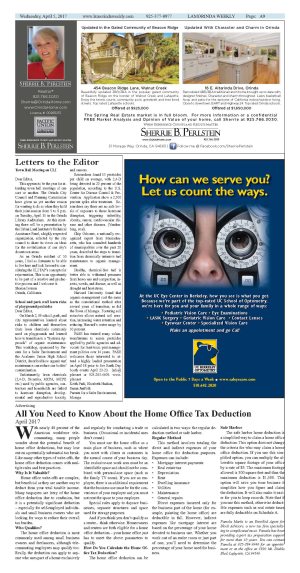| | Published April 5th, 2017
| Letters to the Editor
| | | | |
Town Hall Meeting on ULI

 Dear Editor,
Dear Editor,
 This appears to be the year for attending town hall meetings of one sort or another. The Orinda City Council and Planning Commission have given us yet another reason for wanting to do so when they hold their joint session from 5 to 8 p.m. on Tuesday, April 11 in the Orinda Library Auditorium. At this meeting there will be a presentation by the Urban Land Institute's Technical Assistance Panel, a highly respected organization, selected by the city council to share its views on ideas for the revitalization of our city's downtown areas.
This appears to be the year for attending town hall meetings of one sort or another. The Orinda City Council and Planning Commission have given us yet another reason for wanting to do so when they hold their joint session from 5 to 8 p.m. on Tuesday, April 11 in the Orinda Library Auditorium. At this meeting there will be a presentation by the Urban Land Institute's Technical Assistance Panel, a highly respected organization, selected by the city council to share its views on ideas for the revitalization of our city's downtown areas.
 As an Orinda resident of 50 years, I feel so fortunate to be able to live here and look forward to considering the ULI TAP's concepts for rejuvenation. This is an opportunity to be part of a creative and productive process and I welcome it.
As an Orinda resident of 50 years, I feel so fortunate to be able to live here and look forward to considering the ULI TAP's concepts for rejuvenation. This is an opportunity to be part of a creative and productive process and I welcome it.
 Sharon Iversen
Sharon Iversen
 Orinda, California
Orinda, California

 School and park staff learn risks of playground pesticides
School and park staff learn risks of playground pesticides
 Dear Editor,
Dear Editor,
 On March 2, 89 school, park, and city representatives learned about risks to children and themselves from lawn chemicals commonly used on playgrounds and learned how to transition to a "Systems Approach" of organic maintenance. This workshop, sponsored by Parents for a Safer Environment and the Acalanes Union High School District, described how organic turf maintenance can reduce our bodies' contamination.
On March 2, 89 school, park, and city representatives learned about risks to children and themselves from lawn chemicals commonly used on playgrounds and learned how to transition to a "Systems Approach" of organic maintenance. This workshop, sponsored by Parents for a Safer Environment and the Acalanes Union High School District, described how organic turf maintenance can reduce our bodies' contamination.
 Unfortunately, lawn chemicals (2,4-D, Dicamba, MCPA, MCPP, etc.) used by public agencies, contractors and households are linked to hormone disruption, developmental and reproductive toxicity, and cancers.
Unfortunately, lawn chemicals (2,4-D, Dicamba, MCPA, MCPP, etc.) used by public agencies, contractors and households are linked to hormone disruption, developmental and reproductive toxicity, and cancers.
 Researchers found 13 pesticides per child on average, with 2,4-D being detected in 20 percent of the population, according to the U.S. Center for Disease Control & Prevention. Applicators show a 2,500 percent spike after treatment. Researchers say there are no safe levels of exposure to these hormone disruptors, triggering infertility, obesity, cancer, cardiovascular disease and other diseases. (Vandenberg, et al).
Researchers found 13 pesticides per child on average, with 2,4-D being detected in 20 percent of the population, according to the U.S. Center for Disease Control & Prevention. Applicators show a 2,500 percent spike after treatment. Researchers say there are no safe levels of exposure to these hormone disruptors, triggering infertility, obesity, cancer, cardiovascular disease and other diseases. (Vandenberg, et al).
 Chip Osborne, a nationally recognized expert from Massachusetts, who has consulted hundreds of municipalities over the past 20 years, described the steps to transition from chemically intensive turf maintenance to organic management.
Chip Osborne, a nationally recognized expert from Massachusetts, who has consulted hundreds of municipalities over the past 20 years, described the steps to transition from chemically intensive turf maintenance to organic management.
 Healthy, chemical-free turf is better able to withstand pressures from heavy use and compaction, insects, weeds, and disease, as well as drought and heat stress.
Healthy, chemical-free turf is better able to withstand pressures from heavy use and compaction, insects, weeds, and disease, as well as drought and heat stress.
 Harvard University found that organic management cost the same as the conventional method after several years of transition, as did the Town of Moraga. Fostering soil microbes allows natural soil aeration, increasing water retention and reducing Harvard's water usage by 30 percent.
Harvard University found that organic management cost the same as the conventional method after several years of transition, as did the Town of Moraga. Fostering soil microbes allows natural soil aeration, increasing water retention and reducing Harvard's water usage by 30 percent.
 PASE has trained many volunteers/Interns to assess pesticides applied by public agencies and advocate for least-toxic pest management policies over 14 years. PASE welcomes those interested to attend a highly lauded presentation on April 18 prior to five Earth Day booth events April 21-23. Info@pfse.net or 925-283-4609. www.pfse.net
PASE has trained many volunteers/Interns to assess pesticides applied by public agencies and advocate for least-toxic pest management policies over 14 years. PASE welcomes those interested to attend a highly lauded presentation on April 18 prior to five Earth Day booth events April 21-23. Info@pfse.net or 925-283-4609. www.pfse.net
 Keith Park, Elizabeth Hudson,
Keith Park, Elizabeth Hudson,
 Susan JunFish
Susan JunFish
 Parents for a Safer Environment,
Parents for a Safer Environment,
 Moraga
Moraga


|
| | | | | | | | | | | | |


